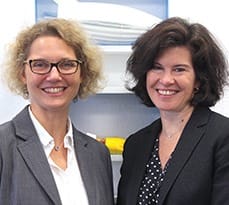Although Cambridge is often described as a vibrant place for entrepreneurs to start a business, many companies in the area are struggling to find qualified employees because young people don’t have skills or experience in business. This is what Anne Bailey and Michaela Eschbach, co-founders of Form the Future venture, are trying to address.

“We want to help young people in schools to explore possibilities in our region and think about what their future careers could look like. We bring business practitioners to schools, provide training and mentoring so students are better prepared when they leave school,” says Anne.
Anne has been working with Cambridge schools since 2013 – she was running the Employer Links programme for Cambridge Area Partnership – and was joined by Michaela Eschbach in 2014. But the funding ran out and the programme was closed in 2015. Anne and Michaela wanted to continue working with schools as they could see the impact of such programmes, so in June 2015 they co-founded Form the Future. The idea was to create a venture that will have a bigger impact in Cambridge and possibly other regions.
“The needs of the business sector are developing very quickly and it’s difficult for schools to catch up in terms of skills. This is a universal problem – not only in Cambridge or the UK, but in other countries too,” says Michaela.
The company now employs 12 full and part-time staff members working flexible hours. Currently the team works with 19 schools in Cambridge, including state-funded secondary schools, sixth form colleges and some independent and primary schools. 43 schools from surrounding areas such as South and East Cambridgeshire, Bedfordshire, Herts and Suffolk are also involved.
Form the Future recently hosted a delegation from China to discuss opportunities in Chinese schools, and are also working with the European Union’s Erasmus study programme to investigate the European market as the next step is to expand abroad.
The company has various programmes for pupils aged from 8 to 18 years. “For someone in Year 5 we could have a workshop like ‘build your own robot’, making a parachute or learning about food digestion,” says Anne. “While someone who is aged 16 would be hearing from business professionals, taking part in career-focused workshops to develop skills, or doing some work experience in a local business.” Work experience has proven to be a very popular offering from Form the Future – over 2,000 students have been matched will local businesses so far.
Another offering – a mentoring programme for students who are at risk of not achieving their goals. Students are matched with a professional of their choice and will meet once a month to work towards personal motivations and how to achieve their goals, including choosing subjects at school or thinking about career pathways.
A student from Sawston Village College explains why support from professionals is so valuable: “It is different, because it is not a teacher telling you to make your CV look good, but somebody who is actually employing people – telling you to make your CV look good, by doing things outside of school – like volunteering.”
Michaela says Cambridge has a very diverse set of employers who are like-minded so it’s easier to connect and work with them. The team now has over 400 companies, such as Abcam, Arm, Microsoft, Addenbrooke’s Hospital, Domino Printing and Cambridge University Press, involved in various programmes.
Jane Paterson-Todd, CEO of Cambridge Ahead, says: “Educating young people on the scope and scale of local opportunities is absolutely imperative to the success of our economy now and into the future. Form the Future are pivotal in making this happen. Their passion, drive, enthusiasm and dedication to helping young people recognise the opportunities in front of them and how to make it a reality is second to none.”
According to Michaela their biggest success so far is a partnership with Marshall Group, one of the largest employers in Cambridge (involved in the aerospace, automobile and property sectors). “In December 2016, we took over the running of Cambridge LaunchPad, a STEM programme aiming to encourage more young people, especially girls, to consider pursuing qualifications in science, technology, engineering and mathematics,” she said. The programme is now supported by 25 companies in addition to Marshall, Schlumberger and Arm joining as Founding Partners.
The main challenge for the venture is to sustain enough funding to support growth. Currently the company is funded by government grants and private companies, but are looking for new donations and sponsorships. “When we started in 2015 we didn’t have any funding and were running business from Future Business Centre (in north Cambridge) that provided us with free office space. On the top of that Cambridge Social Ventures supported us with mentoring and training and helped us to validate our idea. Today we’re in much better position, but still would like to hear from local enterprises, investors and business professionals who’d like to contribute to what we do,” Anne said.
This article is part of Venturing Forth, our new series on the aspirations and challenges of ventures connected to students, alumni and others associated with Cambridge Judge Business School.


